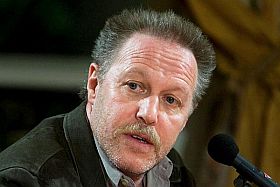


Bakker & van Koevorden: Ne Me Quitte Pas
Shit happens… Det var min hensigt at anmelde, og anmelde positivt om denne fine film, produceret af Hollands fremragende dokumentarproducent Pieter van Huystee. Jeg så den i Amsterdam, hvor den var nomineret til den store pris, men ikke vandt, men det kunne den sådan set godt have gjort for sin indlevende og kærlige beskrivelse af to herlige alkoholiske, lommefilosoferende skæbner, der ligeså godt kunne være bænket i Ørstedsparken om sommeren. Vejrbidte mænd med flaskerne indenfor rækkevidde.
Jeg nåede ikke at skrive før afrejsen til Beograd, så nu nøjes jeg med at gøre opmærksom på filmen, som to dage efter sin premiere via DoxBio stadig er til at se i 10 biografer landet over, se link nedenfor. OG for dem, der som mig oprindeligt troede, at Jacques Brel’s sang er med i filmen – nej, det er den ikke, men derfor kan I godt nynne den efter filmen, som fra starten kalder på melankolien. Her er en beskrivelse fra idfa festivalen:
The Flemish Bob and the Walloon Marcel have come together in the lonely woods and empty fields of Wallonia, the French-speaking part of Belgium. At first everything is bleak, bare and gray, just like the two men feel inside. Both have seen their lives slip through their fingers, and they have come together to share sorrow and drink-sodden nights. Bob, who looks like a weather-beaten explorer, hardly ever sees his grown-up children. He has lost his girlfriend and drinks rum like water. Marcel is a broken man caught up in divorce proceedings who drowns his sorrows in liters of beer, but at least they have one another. Together they visit the dentist, celebrate carnival in the village pub and go to Marcel’s intake at a rehab clinic. But usually they meet at one of their kitchen tables, where drink and conversation flow freely. Although the pair is able to bring a sense of humor to bear on their gloomy lives, they always end up discussing a suicide pact. The camera follows this couple thrown together by fate over several seasons in Direct Cinema style. This exceptional, character-driven story delivers heartwarming and sad, hilarious and very painful moments in provincial Belgium, which, like the two main characters, also seems to be in decay.
Holland/Belgien, 2013, 107 mins.
